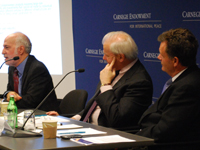Registration
You will receive an email confirming your registration.
IMGXYZ3294IMGZYXReducing carbon emissions from transportation will be essential to achieving greenhouse gas reductions targets of 85 percent by 2050. California is adopting a mix of policies, regulations, and incentives that together provide a coherent and durable framework for creating a more sustainable transportation system.
Carnegie’s Dan Sperling, board member of the California Air Resources Board and professor at University of California, Davis, and Emil Frankel, director of transportation policy at Bipartisan Policy Center, discussed California’s mixed approach and the lessons it offers for U.S. transportation and climate policy.
Transforming Transportation: Vehicles
Sperling argued that improvements in vehicle efficiency will lead to the biggest emissions reductions in the transport sector over the next few decades.
- California Leadership: In 2002, the California legislature adopted AB 1493, a law to reduce greenhouse gas emission from vehicles, Sperling pointed out. The Obama administration subsequently adopted California standards nationwide.
- 2025 Vehicle Standards: In July 2011, members of the auto industry agreed to support aggressive new standards that would reach 54 mile per gallon standard by 2025, Sperling added. California’s Air Resource Board will be the first to adopt that standard in January 2012.
- Conventional Technologies: Sperling argued that most of the efficiency gains through 2025 will be achieved through the use of existing technologies, including hybrid cars, not by relying on a shift to plug–in electric vehicles.
- Rebound Effect: Efficiency gains are unlikely to be offset by increased use of vehicles, resulting from reduced fuel costs, partly because vehicle use is limited by individual travel time constraints, increasing travel congestion, and policies discouraging vehicle use, Sperling said.
- Kick-starting Advanced Vehicle Technology: Through its zero-emission vehicle program, adopted in 1990, California has played a leading role in furthering investment in electric vehicle and fuel cell technology, Sperling explained.
- Beyond 2025: To achieve California’s goal of an 80 percent reduction in greenhouse gases by 2050, a large proportion of vehicles need to shift to fuel-cell and battery technology after 2025, Sperling said. California’s policies are meant to accelerate this process.
Transforming Transportation: Fuels
The transition from a petroleum based transportation system to a renewable and low-carbon fuel based system poses a major challenge, Sperling and Frankel agreed. Biofuels, hydrogen, and electricity are the three most promising fuel options to achieve this transition.
- Fuels du Jour: While different alternative fuels, which Sperling termed “fuels du jour”, have seemed promising at different times over the past three decades, none have so far been proven successful in the long run.
- Low-Carbon Fuel Standard: The low-carbon fuel standard was spearheaded by California, and subsequently adopted by British Columbia and the European Union. This standard requires oil refineries to reduce the carbon intensity of their fuels by 10 percent by 2020. The policy does not limit them to specific technologies, applies to all fuels, and allows companies to meet the standard by purchasing carbon credits. Sperling suggested that this flexible and market based approach will eventually be expanded nationwide.
Transforming Transportation: Mobility
Given the maturity of America’s road and infrastructure systems, changing mobility patterns in the United States is a significant challenge. Sperling explained that addressing mobility is even more important for China and other rapidly expanding economies that are experiencing rapid motorization and vehicle growth. The speed with which motorization occurs in China, India and elsewhere will impact pollution, energy use, and greenhouse gas emissions.
- Co-Benefits: Sperling said that reducing vehicle use has great benefits beyond the reduction of carbon emissions, including the creation of more livable and healthier cities, reducing urban sprawl, and reducing infrastructure costs.
- Sustainable Communities Act: All major cities in California have reduction targets between 7 to 8 percent per capita for greenhouse gases from passenger travel, to be achieved by 2020. These targets will be met mainly through a reduction in sprawl and vehicle miles travelled. Mechanisms for financially rewarding cities which meet their target are currently still under discussion.
The California Model
Sperling pointed out that California designs its greenhouse gas policies in the hopes that the federal government and other countries will follow its lead. Therefore, the policies are designed to be compatible and scalable. He argued that strong policies, the use of pricing mechanisms, and regulatory actions are all necessary to overcome market failures in the transportation sector and to create innovation and change. Frankel agreed with Sperling, pointing out that performance-based and market based policies are needed that require specific goals without prescribing the means to achieve them. He also expressed admiration for California’s legislation, regulation, and public policy in the area of energy and climate change and called California’s progress in that regards “extraordinary” and “unbelievable.”
